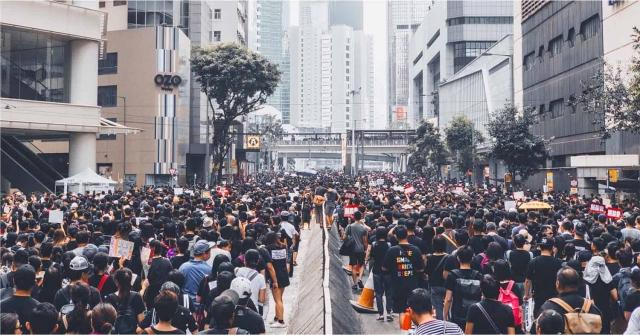Hong Kong protests recently entered their 11th month and show no sign of slowing. The Hong Kong government’s proposed Fugitive Offenders amendment bill (known colloquially as the extradition bill) sparked rage among millions of Hongkongers who saw the bill as Chinese government overreach and a threat to civil liberties and freedom.
Despite the ongoing protests, Hong Kong is the fifth-most attractive international market for growing tech firms, according to Velocity Global’s 2020 State of Global Expansion™ Report: Technology Industry, which surveyed over 1000 U.S. and UK business leaders.
However, both local and international businesses bear the brunt of the protests. Many companies in Hong Kong adopted a color-coded system identifying their alignment with protestors or the police: yellow businesses signal protestor support, while blue businesses side with the police and the state but not all businesses take sides.
Companies considering an expansion into Hong Kong must remain aware of the current situation, developments, and draft global expansion plans that anticipate unforeseen economic and social challenges.
How the Hong Kong Protests Impact Businesses of All Sizes
For years, Hong Kong attracted businesses from all over the globe, from ambitious startups to global giants, and every size in between. Now, with Hong Kong’s economic, social, and political unrest, these same businesses face unprecedented challenges.
Social unrest took a toll on the Hong Kong economy, dropping 2.25% in 2019 and projected to fall an additional 3.55% in 2020. The country dipped into a recession in the second half of 2019; annualized, its GDP shrunk 2.9%—the largest dip in GDP in a decade.
30% of Hong Kong businesses plan to cut retail jobs—as many as 5,600—in the next four months, according to the Hong Kong Retail Management Association’s report released last December. 43% of respondents said closure is eminent within six months. 97% of all survey respondents report record losses.
Financial services companies must exercise caution, as well. Hong Kong’s biggest bank, HSBC, announced in January an ATM service shutdown on weekend evenings and holidays in locations experiencing the most protests.
Still, the Hong Kong dollar sits near a three-year high, and the Hang Seng Index traded at its highest since July. Hong Kong’s Securities and Futures Commission chief executive stated that markets experienced a “hyper stress test” and performed well under the pressure.
Despite a bleak global perception, 26% of U.S. and UK tech businesses still see Hong Kong as one of the most promising markets for accessing qualified talent to grow their businesses, topping China. The number of overseas-owned businesses in Hong Kong grew 9.9% since 2017, signaling companies’ confidence in Hong Kong’s economy.
Global Expansion Alternatives to Hong Kong
Despite many U.S. and UK business leaders’ view that Hong Kong remains attractive, some businesses now seek other global expansion alternatives in the region.
Singapore topped Velocity Global’s 2020 Global Expansion Tech Index™, a top-markets list compiled from U.S. and UK decision-makers’ responses—up four spots from last year’s Index. Singapore’s government is stable and offers attractive tax rates similar to Hong Kong’s favorable corporate and individual tax rates. Firms take advantage of talented workers and high-quality infrastructure and connectivity.
South Korea remains a top market for expanding tech firms. South Korea’s global technology output remains central to its 2.4% projected GDP growth. Businesses find a stable, tech-friendly economy with increased government spending and investment in 2020.
Sharing a peninsula with Singapore, Malaysia also tops other Asian markets for growing tech firms. Malaysia’s strong ties with the international community and developed banking sector make it an attractive alternative to Hong Kong. It also boasts robust infrastructure, meaning fewer shipping and logistics challenges found in other Asian markets.
How International Businesses’ Global Expansion Plans Account for Hong Kong Unrest
Hong Kong’s future and how its political and economic systems impact growing tech firms remains uncertain. However, firms mitigate much of this uncertainty by utilizing an agile global expansion method.
Traditionally, businesses set up entities when expanding overseas. Entity establishment makes sense for companies that have $15,000-$20,000 to spend on initial setup and $200,000 to spend on annual maintenance; have dedicated internal resources to manage the setup; can commit to a market for five-plus years.
Firms must consider each point when determining their global expansion plan, but the last point remains central to Hong Kong expansion. Firms must weigh current economic, social, and political uncertainty when planning for a long-term presence in Hong Kong. Entity establishment is expensive, and teardown is costly and extremely time-consuming. Firms with limited budgets cannot absorb these financial and time-intensive shocks.
But entity establishment isn’t the only option. Businesses save significantly when partnering with an International PEO (Professional Employer Organization). International PEO, also known as Employer of Record (EOR), is up to 60% most cost-effective and 90% faster than entity setup. With no entity, businesses in Hong Kong can exit it just as quickly as they entered if the country’s business climate worsens.
Go Global with Confidence with an Experienced Expansion Partner
Speculation surrounds Hong Kong’s future and how businesses in the interim adapt. Companies eyeing Hong Kong mitigate risks by partnering with an expansion partner that helps them navigate the complexity.
Velocity Global’s global Employer of Record helps firms across all sectors enter international markets. Our team of experts ensures businesses enter markets with confidence, and the support needed to push their business forward.
Want to learn how Velocity Global changed the global expansion experience? Let’s talk.
Topic:
Global Growth



